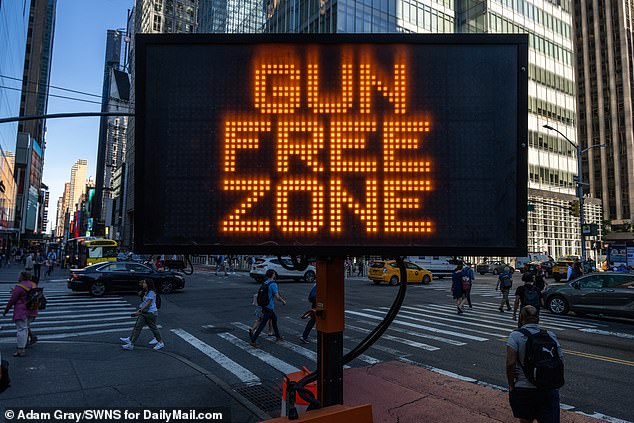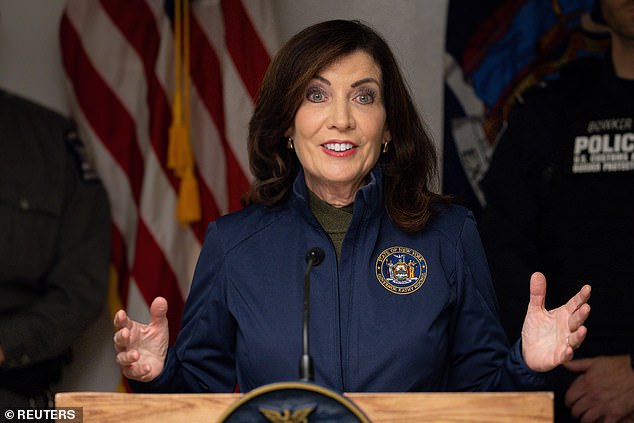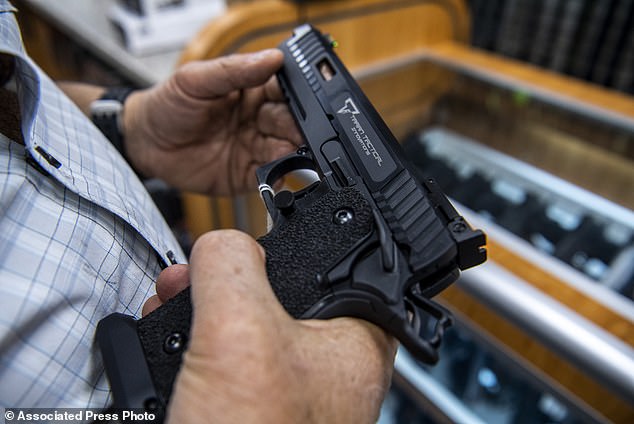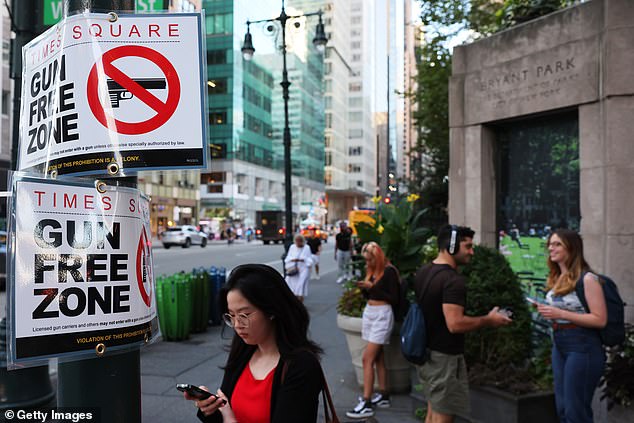Gun owners celebrate after federal appeals court shoots down parts of New York’s strict conceal carry laws including ban on firearms in houses of worship in shock 261-page decision
Gun owners are rejoicing after the federal appeals court struck down parts of New York's strict concealed weapons law.
A three-judge panel of the 2nd US Circuit Court of Appeals blocked aspects of the state's Concealed Carry Improvement Act in a 261-page decision.
The bill was passed by Democrats last year in response to a Supreme Court ruling that declared previous concealed carry permit requirements unconstitutional.
But the federal appeals court struck down parts, including a ban on people bringing firearms into places of worship.
The court also rejected a requirement that gun permit applicants submit a list of social media accounts they have maintained over the past three years, citing freedom of speech concerns.

Gun owners are rejoicing after the federal appeals court struck down parts of New York's strict concealed weapons law

The bill was passed by Democrats last year in response to a Supreme Court ruling that declared previous concealed carry permit requirements unconstitutional. Pictured: New York Governor Kathy Hochul
The court also said the state cannot enforce a portion of the law that makes it a misdemeanor to carry a concealed weapon on private property without the express permission of the owner. This would have banned firearms from places like stores, supermarkets and restaurants unless the owner put up a sign saying guns were welcome.
However, it did allow the state to continue its ban on firearms in so-called “sensitive” locations, such as public transportation, hospitals and schools.
Other controversial aspects, including the requirement for firearms applicants to demonstrate good moral character and identify members of their household and family when applying for a permit, have been retained.
Gun rights activists applauded the decision but insisted that the justices had failed to faithfully apply Supreme Court precedent and that the entire law should be thrown out.
Erich Pratt of the Gun Owners of America, a lobbying group involved in the lawsuit, said the group is considering taking the case to the Supreme Court.
'Governor [Kathy] Hochul and her cabal in Albany never seem to get the message, and in turn, Gun Owners of America is proud to have played a major role in calling out her unconstitutional law,” he said in a statement.
“Yet this was not a total victory, and we will continue the fight until this entire law is consigned to the bowels of history, where it belongs.”

But the federal appeals court struck down parts, including a ban on people bringing firearms into places of worship
The appeals court ruling came at the early stages of a legal battle that would likely ultimately end up back before the Supreme Court after the justices in 2022 overturn New York's old rules for obtaining a permit to carry a handgun outdoors. wear, had been deleted.
For decades, the ability to legally carry guns in public was limited to people who could demonstrate a special need for protection.
State officials responded by drafting legislation intended to open the door to more people obtaining gun permits, but at the same time imposed a host of new restrictions on where guns could be carried.
Lawmakers took action months after a white supremacist killed 10 black people at a Buffalo supermarket, banning firearms in places including public playgrounds and schools, theaters, places where alcohol is served, on buses and at airports.
Multiple lawsuits were filed challenging the rules, leading to a series of lower court decisions upholding part of New York's new law but ruling that other aspects were unconstitutional.
In their ruling Friday, the justices wrote that it was “not prima facie unconstitutional” for the state to require applicants for a permit to carry a handgun to be of good moral character.
“A reasoned denial of a carry permit to an individual who, if armed, would pose a danger to himself, others, or the public is consistent with the well-recognized historical tradition of preventing dangerous individuals from possessing weapons,” the wrote. court. .
But the judges ruled against the requirement that applicants for a firearms license provide a list of their social media accounts.
“Requiring applicants to disclose even the pseudonymous names under which they post online constitutes an impermissible infringement of Second Amendment rights that is unsupported by analogues in the historical record and which further raises serious First Amendment concerns.” , the court wrote.

A three-judge panel of the 2nd US Circuit Court of Appeals blocked aspects of the state's Concealed Carry Improvement Act in a 261-page decision
The U.S. Supreme Court, in its ruling last year striking down New York's old gun regulations, had suggested that there were some restrictions on who could carry guns, and where they could be carried, that were acceptable as long as they were in compliance with the long tradition of arms trading. gun regulation in the United States.
Judges have since struggled to apply that finding by examining old gun rules from decades or even centuries in the past, often reaching starkly different conclusions.
In their ruling Friday, the 2nd Circuit judges suggested that some lower courts were too dismissive of some of the “historical analogues” offered by the state as evidence that its restrictions on guns in sensitive places fell within a national tradition of regulation .
But regarding the ban on weapons in places of worship, the court ruled that the state may have violated religious freedom by creating different rules for churches, synagogues and mosques than for places where groups of people gather for secular activities.
“New York State cannot tell houses of worship how to protect their people,” said Jeremy Dys, senior counsel at the First Liberty Institute, which represents a pastor who has sued over the law.
“At this stage, the state has not demonstrated that allowing church leaders to regulate the firearms of their congregants is more dangerous than allowing other property owners to do the same,” the judges wrote.
“It is difficult to see how the law advances the interests of religious organizations as a whole by denying them the freedom to choose whether to allow firearms.”
New York Governor Kathy Hochul and Attorney General Letitia James said the ruling will keep New Yorkers safe.
“This common sense law was introduced to keep guns out of dangerous hands and away from schools, hospitals, parks, public transportation and other sensitive locations,” James said in a statement.
